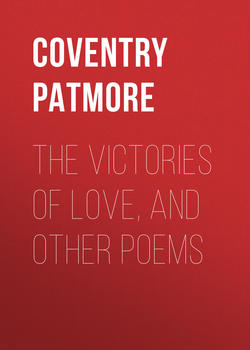Читать книгу The Victories of Love, and Other Poems - Coventry Patmore - Страница 12
THE VICTORIES OF LOVE
BOOK I
XI. FROM MRS. GRAHAM
ОглавлениеYou wanted her, my Son, for wife,
With the fierce need of life in life.
That nobler passion of an hour
Was rather prophecy than power;
And nature, from such stress unbent,
Recurs to deep discouragement.
Trust not such peace yet; easy breath,
In hot diseases, argues death;
And tastelessness within the mouth
Worse fever shows than heat or drouth.
Wherefore take, Frederick, timely fear
Against a different danger near:
Wed not one woman, oh, my Child,
Because another has not smiled!
Oft, with a disappointed man,
The first who cares to win him can;
For, after love’s heroic strain,
Which tired the heart and brought no gain.
He feels consoled, relieved, and eased
To meet with her who can be pleased
To proffer kindness, amid compute
His acquiescence for pursuit;
Who troubles not his lonely mood;
And asks for love mere gratitude.
Ah, desperate folly! Yet, we know,
Who wed through love wed mostly so.
At least, my Son, when wed you do,
See that the woman equals you,
Nor rush, from having loved too high,
Into a worse humility.
A poor estate’s a foolish plea
For marrying to a base degree.
A woman grown cannot be train’d,
Or, if she could, no love were gain’d;
For, never was a man’s heart caught
By graces he himself had taught.
And fancy not ’tis in the might
Of man to do without delight;
For, should you in her nothing find
To exhilarate the higher mind,
Your soul would deaden useless wings
With wickedness of lawful things,
And vampire pleasure swift destroy
Even the memory of joy.
So let no man, in desperate mood,
Wed a dull girl because she’s good.
All virtues in his wife soon dim,
Except the power of pleasing him,
Which may small virtue be, or none!
I know my just and tender Son,
To whom the dangerous grace is given
That scorns a good which is not heaven;
My Child, who used to sit and sigh
Under the bright, ideal sky,
And pass, to spare the farmer’s wheat,
The poppy and the meadow-sweet!
He would not let his wife’s heart ache
For what was mainly his mistake;
But, having err’d so, all his force
Would fix upon the hard, right course.
She’s graceless, say, yet good and true,
And therefore inly fair, and, through
The veils which inward beauty fold,
Faith can her loveliness behold.
Ah, that’s soon tired; faith falls away
Without the ceremonial stay
Of outward loveliness and awe.
The weightier matters of the law
She pays: mere mint and cumin not;
And, in the road that she was taught,
She treads, and takes for granted still
Nature’s immedicable ill;
So never wears within her eyes
A false report of paradise,
Nor ever modulates her mirth
With vain compassion of the earth,
Which made a certain happier face
Affecting, and a gayer grace
With pathos delicately edged!
Yet, though she be not privileged
To unlock for you your heart’s delight,
(Her keys being gold, but not the right,)
On lower levels she may do!
Her joy is more in loving you
Than being loved, and she commands
All tenderness she understands.
It is but when you proffer more
The yoke weighs heavy and chafes sore.
It’s weary work enforcing love
On one who has enough thereof,
And honour on the lowlihead
Of ignorance! Besides, you dread,
In Leah’s arms, to meet the eyes
Of Rachel, somewhere in the skies,
And both return, alike relieved,
To life less loftily conceived.
Alas, alas!
Then wait the mood
In which a woman may be woo’d
Whose thoughts and habits are too high
For honour to be flattery,
And who would surely not allow
The suit that you could proffer now.
Her equal yoke would sit with ease;
It might, with wearing, even please,
(Not with a better word to move
The loyal wrath of present love);
She would not mope when you were gay,
For want of knowing aught to say;
Nor vex you with unhandsome waste
Of thoughts ill-timed and words ill-placed;
Nor reckon small things duties small,
And your fine sense fantastical;
Nor would she bring you up a brood
Of strangers bound to you by blood,
Boys of a meaner moral race,
Girls with their mother’s evil grace.
But not her chance to sometimes find
Her critic past his judgment kind;
Nor, unaccustom’d to respect,
Which men, where ’tis not claim’d, neglect,
